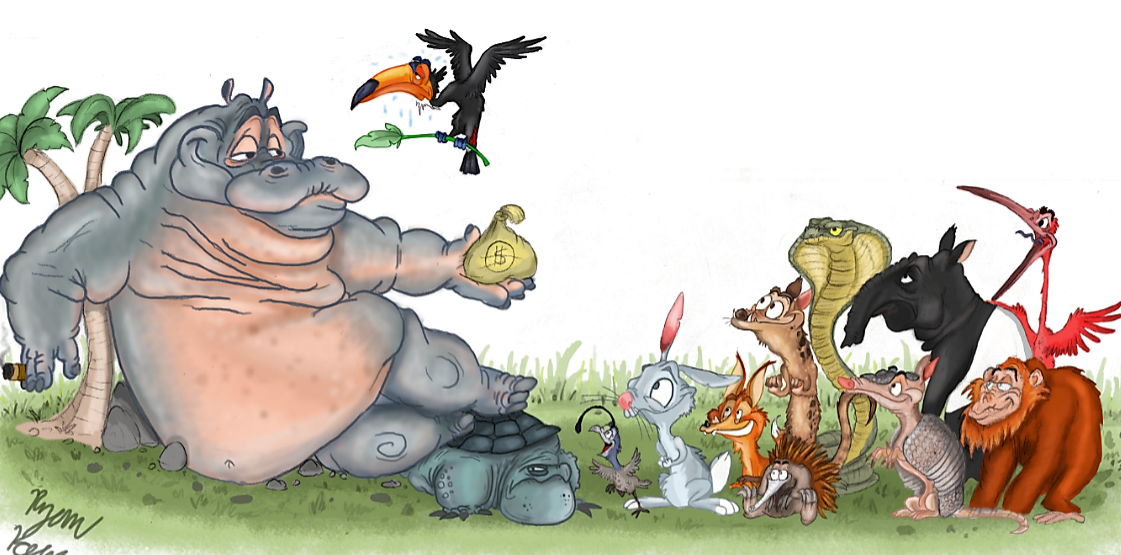Philanthrocapitalism: Whose Responsibility Is It to Save the World?
by Mandi Moon | published Feb. 5th, 2016
"The man who dies rich, dies disgraced," said Andrew Carnegie from atop his throne of steel mills and lean manufacturing. Many modern billionaires seem to take this philosophy to heart. On Dec. 1, 2015, Mark Zuckerberg, the co-founder, chairman and CEO of Facebook, announced via an open letter to his newborn daughter that he would be selling 99 percent of his Facebook shares — which, according to the New Yorker, amounts to a net worth of about $45 billion — and using the proceeds to form a limited liability company (LLC) called the Chan Zuckerberg Initiative.
This initiative, according to Zuckerberg, is about "advancing human potential and promoting equality." The media has used the terms "philanthrocapitalism" and, less often, "venture capitalism" in order to describe undertakings such as this one that utilize this blending of business — since the initiative is indeed a business, not a non-profit entity — and philanthropic purposes.
LLCs vs. Non-Profit Organizations
Not all of us have attended business school, and therefore may not be entirely clear on what actually differentiates an LLC from a non-profit organization. Some of the differences get technical, complicated and can even vary in individual cases. In general, the basic differences have to do with the way the different organizations are funded, the ways they are or aren't taxed, benefits that stakeholders and funders do or don't receive, the permitted uses of profits, government regulation and documentation requirements.
Non-profits are primarily funded by grants, which can be given by either the federal, state or local government, corporations, other non-profit organizations or wealthy individuals. They are tax-exempt and usually aim to make improvements in the world that we live in or provide essential services that may not necessarily result in monetary benefit to the financiers. Examples of such organizations range from the American Cancer Society to National Public Radio. In addition, for-profit companies often have non-profit branches, such as McDonald's Corporation's Ronald McDonald House Charities. Although the nomenclature is misleading, non-profits can indeed make money; the difference lies in that they are not allowed to use that money in order to benefit private parties. They also must keep extensive documents on how their funding and profits are used and are frequently required to spend their profit (money they made that exceeded their expenses) within the confines of the same fiscal year.
LLCs, unlike non-profits, are taxable and usually aim to make money for those involved. They are subject to far fewer formalities than both corporations and non-profit organizations and are not required to use their funding or profits in any specified or regulated manner. It is perfectly within the rights of an LLC to benefit whomever the management would like with its profits, including private parties.
"By using an LLC instead of a traditional foundation, we receive no tax benefit from transferring our shares to the Chan Zuckerberg Initiative, but we gain flexibility to execute our mission more effectively," wrote Zuckerberg in his letter. By choosing to form an LLC rather than a non-profit organization, Zuckerberg has allowed himself far more freedom and discretion in the way he and his wife run the Chan Zuckerberg Initiative, and to what use they put their funds and the capital they might raise. They are not subject to the usual regulations of non-profits, but in turn they must pay taxes on any monetary returns they receive through the initiative.
John Cassidy of the New Yorker writes that the first part of Zuckerberg's statement may be less than 100 percent truthful, however: "Whenever the Chan Zuckerberg Initiative issues grants to nonprofit organizations, it will almost certainly do so by donating some of its Facebook stock, and that will generate tax credits for Zuckerberg and Chan equal to the market value of the stock at that time."
The Concept of Philanthrocapitalism
This blending of business and philanthropy has come to be known as "philanthrocapitalism." Defining this word is more complicated than it probably should be. Economists and business journalists have defined it as a way of going about philanthropy or charity "which mirrors the way that business is done in the for-profit capitalist world," according to Philanthrocapitalism.net. At time of writing, there is not a universally agreed-upon definition and the word does not yet appear in either the Oxford or Merriam-Webster Dictionaries.
According to The Economist, three conditions have to be met in order for philanthrocapitalism to be successful as a movement: philanthropists need to become "social entrepreneurs" with something in which to invest; the creation of a philanthropic infrastructure, including some equivalent to the stock market; and philanthropic investors need to be able to quantify the impact their investment is having in order to maximize their "social return."
Although it is the most contemporary and possibly the most obvious example of philanthrocapitalism, Zuckerberg's LLC is by no means the only examples of what happens when billionaires have philanthrocapitalistic tendencies. Bill and Melinda Gates, George Soros and Michael Bloomberg have also been given the label of "philanthrocapitalist": the Gates for their distribution of vaccines and healthcare, Soros for his contributions to civil rights organizations and Bloomberg for his advocacy for gun law reform.
Societal Implications of Philanthrocapitalism
Perhaps one of the distinguishing characteristics of philanthrocapitalists who use LLCs to further their ideals is that they have complete discretion in deciding how to use their funds in order to "benefit humanity." They are not accountable to any sort of government or regulation authority, or even a board of directors. There are some that claim this makes the very practice of philanthrocapitalism anti-Democratic; who are these billionaires sitting high above poverty to decide which issues deserve their attention?
They have complete discretion in deciding how to use their funds in order to "benefit humanity."
"For the first time in modern history, it has become the conventional wisdom that private business — the most politically influential, undertaxed and underregulated sector among those groups that dispose of real power and wealth in the world, as well as the least democratically accountable — should be entrusted with the welfare and fate of the powerless and the hungry," said journalist David Rieff in his Nation article titled "Philanthrocapitalism: A Self-Love Story."
That is not to say that charity work done by individuals is inherently evil; for a long time, the mega-rich have been benefactors of education and scientific advancement. Carnegie was deeply involved in building more than 3,000 public libraries and founded several charitable organizations. John D. Rockefeller helped develop vaccines for devastating diseases such as yellow fever and helped jumpstart the field of biomedical research. Zuckerberg himself has given millions of dollars to hospitals and public school systems.
Because of this, there are those who view philanthrocapitalism as game-changing in a more positive light than Rieff. In discussing Zuckerberg's new initiative, Felix Salmon of Fusion wrote in a blog post that "He doesn’t want to create something which just keeps on doing the same thing for hundreds of years. He wants to spend billions of dollars today (or at least within his lifetime) on something transformational, which could help transform the lives of billions of future inhabitants of the planet for the better." The post was linked directly to the Chan Zuckerberg Initiative Facebook page. Salmon likens philanthropy to a risky business venture; yes, some efforts will fail, but some will be spectacularly successful.
"We are now living through the second golden age of American philanthropy. What Andrew Carnegie and John D. Rockefeller were to the early twentieth century, Bill Gates and Warren Buffett are to the early twenty-first century," wrote Rob Reich of the Boston Review. He also stated that independent philanthrocapitalists, unlike governments and non-profit entities, are not subject to the opinions of the masses or governing boards, which allows them to pay more attention to issues that may not be as prominent in the public eye but are still important.
Internet.org: The Superrich and "Philanthropy"
For an example of how philanthrocapitalism can backfire, let's go back to Zuckerberg and his efforts to improve the planet: according to him, one of the most efficient ways to do this is to give everyone access to the internet. In Zuckerberg's letter, he implies that access to the internet can help make up for a lack of education, health care, financial services and job search opportunities. He says that if we give internet to those who are currently unable to access it, we will be able to "lift hundreds of millions of people out of poverty."
In theory, this is all well and good. I personally love the internet; it has helped me through personal, financial and health care problems in the past. In practice, however, a trend of individuals deciding on how to dole out internet access may be a bit more sinister than it first appears, especially to those in favor of the preservation of net neutrality. According to Bloomberg Business, at the end of December 2015, Facebook — and by extension, Zuckerberg — experienced backlash when critics took issue with its efforts to provide free internet to India, known as Internet.org, because it only allowed access to certain (read: Facebook-approved) websites. According to Facebook, the reason they only offered a few websites was so that participants would see the value in the internet and be able to experience all its benefits. However, Vindu Goel wrote in the New York Times that "contrary to its altruistic claims, the project is simply a way to get them onto Facebook and to sign up for paid plans from Reliance [the main internet provider in the area]."
Although the Internet.org initiative is not directly connected to the Chan Zuckerberg initiative, it gives a glimpse into what happens when we put the power of societal advancement in the hands of the few, the powerful, the superrich. We need to ask ourselves whether we as a society are comfortable with letting the very few with access to riches and resources that we couldn't even imagine who are accountable to no one but themselves — the philanthrocapitalists — deciding which parts of our lives are important enough to warrant development.
However, there may be an even deeper issue: how is it that we have built a society in which the only forces who are able to do anything about issues such as poverty, hunger, illness, poor education and violence are those with billions of dollars to their name? If our governments are powerless to stop the gross injustices that occur around the world today and an individual takes those issues on to his or her own shoulders, who are we to criticize them? This issue is by no means black and white, but somewhere in between. In order to ensure that we are doing all we can to benefit those who need it, we need to ask if we are willing to sacrifice some things along the way. We need to discover the best way to help without hurting.
How is it that we have built a society in which the only forces who are able to do anything about issues such as poverty, hunger, illness, poor education and violence are those with billions of dollars to their name?





